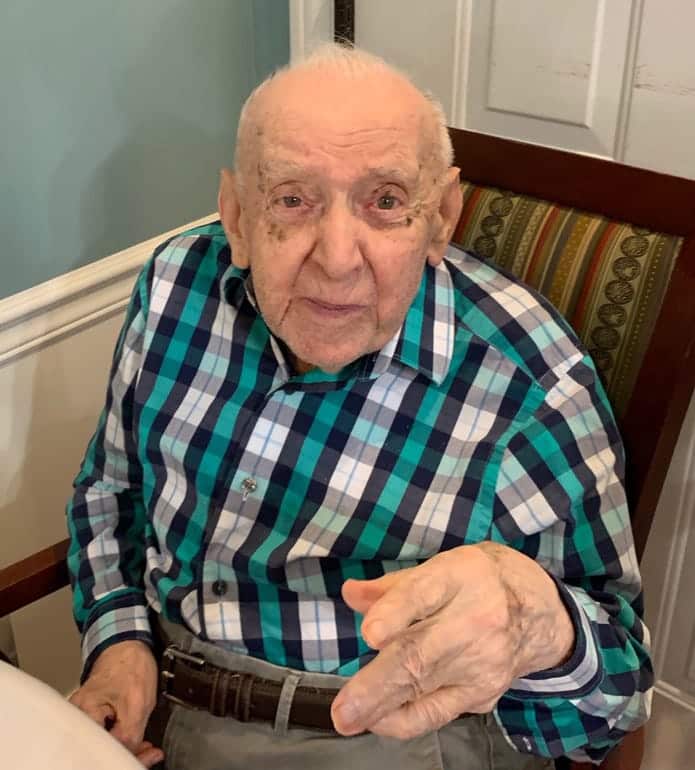Editor’s note: This is one of a continuing online series of profiles of the more than 12,000 Hoosiers who have died from COVID-19. The stories are from 12 Indiana newspapers, including The Republic, who collaborated to create the collection to highlight the tremendous loss that the pandemic has created. The series appears daily at therepublic.com.
Name: Martin Weingarten
City/Town: Carmel
Age: 100
Died: April 16
Martin Weingarten was born amid the Spanish flu, during the most severe pandemic in recent history, the son of two candy shop owners in Austria.
He would grow into a curious and anxious teenager who would watch from his family’s fourth floor apartment as the Nazis brutally beat his Jewish neighbors on the sidewalks of Vienna.
Weingarten escaped and spent a glorious 80 years in the United States, first in New York working for his uncle and then at a U.S. Air Force base. Then in Maryland, as an employee of the United States Census Bureau.
Weingarten died April 16 in Carmel amid the world’s most recent pandemic. Coronavirus was ruled his cause of death, according to his nephew Joe Weingarten.
He never knew he had contracted COVID-19. By the time he died, Weingarten suffered from dementia, his nephew said.
But this 100-year-old man never let the trials of his life taint his outlook or destroy his goodwill.
“Oh, he was very friendly, very happy,” said Joe Weingarten, 75, of Fishers. “He was always the nicest guy in the room. He was always smiling, always one of those kind- hearted fellows.”
Weingarten was born Nov. 28, 1919 during the Spanish flu, also known as the 1918 influenza pandemic. That health crisis was caused by an H1N1 virus with genes of avian origin, according to the Centers for Disease Control and Prevention.
The flu spread worldwide and, from 1918 to 1919, infected 500 million people, one third of the world’s population. The number of deaths is estimated to be at least 50 million, with about 675,000 in the United States, the CDC says.
Weingarten, however, was born safely to Mancie and Isak Weingarten, the youngest of three boys.
The family lived in an apartment above the candy shop in “calm surroundings” with a “close-knit family,” Weingarten wrote in a 9-page, 45,000-word document for his family he titled “A Brief Personal History of My Self and Family.”
By the time he was a teen, Weingarten’s parents sold the candy shop and opened a general store, offering household items like soaps, cleaning compounds and a variety of fragrances. It was a great financial success, enough so that the Weingartens bought two four-story apartment buildings and moved their family into the top floor of one of them.
Weingarten even as a young boy was always interested in world events. He became more interested as the world around him turned dire. Adolf Hitler, leader of the Nazi Party, was insisting that Austria be merged into Germany.
“In the end, Hitler managed to lure the head of the Austrian government to a fateful meeting, where he forcibly detained and stripped him of his position,” Weingarten wrote.
That meeting was followed by Germany’s invasion of Austria on March 12, 1938.
Within weeks of the invasion, Izak Weingarten was picked up, along with other Jewish business owners, by Nazi authorities. He was held in detention and threatened. He was eventually released, only after he agreed to give up his general store and appoint an administrator for the apartment buildings.
“All of us were, of course, relieved to see him come home safely,” Weingarten wrote. “The loss of property and income was no longer important.”
Weingarten, 18, and his brother Morris managed to obtain the appropriate documentation and, in the summer of 1938, left Vienna by train headed to Konstanz in Germany. There, they hoped to cross into Switzerland. The Gestapo, German Secret Police in Konstanz, had been rumored to help guide emigrants across the Swiss border.
“Emigrants were allowed only to take 10 deutsche marks out of Germany, but our father had given us a number of dollar bills which we hid in a stick of shaving soap,” Weingarten wrote.
With the help of Gestapo officers, housing was arranged for Weingarten at a nearby abandoned former hilltop hostel in Switzerland. While there with other Jewish young men, they performed labor, repair and maintenance and, sometimes, played games and sports.
In early March 1939, after almost eight months in the camp, the Weingarten brothers received word from the American Embassy in Zurich that their entry visas were ready. After making their way to Zurich and then Antwerp, they boarded a passenger ship bound for New York.
Throughout the next 80 years, Weingarten would never take for granted the life he was living. A stint in the U.S. Army in 1943 before being medically discharged for scarlet fever. Earning his college degree in business administration and statistics in June 1959.
And his marriage to his dear Elisabeth in February of 1950.
At 39, after working for his uncle for nearly two decades, Weingarten landed a job as a management analyst at an Air Force Base in Rome, New York. He later was transferred to the Census Bureau in Suitland, Maryland. He ended his 26-year-career there as senior economic advisor to the assistant director for economic fields in 1984.
Until a few years ago, Weingarten still read the “Wall Street Journal” every day, his nephew said. When visiting him one day at The Stratford in Carmel, Joe Weingarten noticed the newspaper tucked under his uncle’s arm.
He asked someone at The Stratford if he still read it. “No, he just carries it around,” he was told. Joe Weingarten canceled his uncle’s subscription. The next time he visited, Weingarten had found a copy of IndyStar and had it tucked under his arm.
Weingarten and Elisabeth moved to The Stratford retirement community about 10 years ago to be near his nephew. He and Elisabeth, who died several years ago, never had children, due to her time in four concentration camps.
— Contributed by the Indianapolis Star





